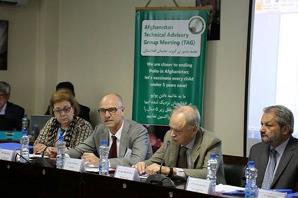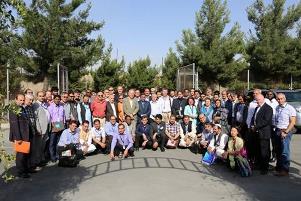 WHO Representative Dr Richard Peeperkorn delivers his opening remarks at the TAG meetingKabul 17 July 2016 - The Technical Advisory Group (TAG) on polio eradication convened in Kabul to review Afghanistan’s progress in polio eradication, provide recommendations for intensifying efforts to stop the circulation of wild poliovirus by the end of this year and review the National Emergency Action Plan for Polio for 2016–2017. The TAG appreciated the significant progress achieved so far and highlighted major improvements in Afghanistan’s polio eradication efforts.
WHO Representative Dr Richard Peeperkorn delivers his opening remarks at the TAG meetingKabul 17 July 2016 - The Technical Advisory Group (TAG) on polio eradication convened in Kabul to review Afghanistan’s progress in polio eradication, provide recommendations for intensifying efforts to stop the circulation of wild poliovirus by the end of this year and review the National Emergency Action Plan for Polio for 2016–2017. The TAG appreciated the significant progress achieved so far and highlighted major improvements in Afghanistan’s polio eradication efforts.
The second TAG meeting of 2016 brought together senior leaders from the Ministry of Public Health, the Global Polio Eradication Initiative, donor agencies and national and provincial polio teams as they presented the gains and achievements of the programme in the last 6 months since the group last met.
“Afghanistan has seen significant progress in polio eradication. We acknowledge the extremely challenging situation in Afghanistan and appreciate the hard work done by all involved in the polio programme,” said TAG Chairman Jean-Marc Olive. “We commend the Government of Afghanistan and partners for strengthening programme management and coordination structures to accelerate progress.”
Minister of Public Health Dr Ferozuddin Feroz underlined the government’s commitment to stopping the circulation of wild poliovirus by the end of 2016.
Gains in a challenging environment
The TAG noted that Afghanistan has witnessed significant progress in its polio eradication programme as demonstrated by polio epidemiology, improvements in population immunity and the quality of supplementary immunization activities and vaccination campaigns.
Most of Afghanistan is now polio-free. Transmission is limited to a small geographical area in Kunar province in the East and the northern parts of Helmand and Kandahar in the south. Transmission in the east illustrates the importance of common reservoir transmission between Pakistan’s Khyber Pakhtunkhwa and FATA and the area bordering Afghanistan; however, Afghanistan has been able to limit the transmission to a fairly small area. No wild poliovirus has been detected in environmental samples through surveillance in 2016.
The TAG highlighted that Afghanistan has a sensitive polio surveillance system and the circulation of poliovirus is therefore unlikely to be missed.
 New achievements and initiatives commended by TAG include the revision and validation of micro plans in 47 very high-risk districts, revision and implementation of a new training module for frontline health workers and a modified revisit strategy that ensures that more children are reached during vaccination campaigns.
New achievements and initiatives commended by TAG include the revision and validation of micro plans in 47 very high-risk districts, revision and implementation of a new training module for frontline health workers and a modified revisit strategy that ensures that more children are reached during vaccination campaigns.
“There have been significant improvements in coordination between Pakistan and Afghanistan on polio eradication efforts with regular exchange of information, coordination and face-to-face meetings between Emergency Operations Centres at national and local levels,” said Dr Olive.
Despite these achievements, many challenges remain on the road ahead to reaching a polio-free Afghanistan. The recent deterioration of the security and access situation, particularly in the northeast and eastern regions, is a cause for concern. The proportion of under-immunized children remains high in Helmand and Kandahar and has increased in Kunar.
The programme is actively addressing accessibility issues through for example installing permanent vaccination points around inaccessible areas, ensuring vaccination from all nearest health facilities and engaging with communities to guarantee access while maintaining strict neutrality.
“I would like to acknowledge the contributions of our brave and heroic frontline health workers who often put their lives at risk to ensure that life-saving vaccines reach everyone,” said Dr Richard Peeperkorn, WHO Country Representative. “WHO remains committed to bringing Afghanistan across the finish line for polio eradication and we will continue our efforts with partners toward that goal. We have a narrow window of opportunity to stop polio once and for all.”
Closer to the finish line
In 2015, 20 polio cases were reported, down from 28 cases in 2014. 6 cases have been reported so far this year. In the coming year, the programme will focus on consolidating the new interventions introduced this year to further improve vaccination campaign quality. Gaining access to inaccessible areas is a priority.
 Officials from the Ministry of Public Health, donor agencies, UNICEF and WHO took part in the TAG meetingThe TAG urged the programme to continue its strict adherence to programme neutrality and intensify efforts to reach children who cannot currently be accessed during vaccination campaigns. The Group called for sustained engagement with local influences, such as religious leaders and community elders, and efforts to explore new forums for discussions to gain access in the eastern and northeastern regions.
Officials from the Ministry of Public Health, donor agencies, UNICEF and WHO took part in the TAG meetingThe TAG urged the programme to continue its strict adherence to programme neutrality and intensify efforts to reach children who cannot currently be accessed during vaccination campaigns. The Group called for sustained engagement with local influences, such as religious leaders and community elders, and efforts to explore new forums for discussions to gain access in the eastern and northeastern regions.
Recommendations were also made to further strengthen the links and coordination between the polio programme and routine immunization services. The TAG recommended that efforts continue to rapidly operationalize the full-time deployment of the Immunization Communication Network to boost ongoing social mobilization and community outreach activities. TAG members also endorsed the 2016–2017 National Emergency Action Plan for Polio which will guide the programme’s interventions in the coming year.
“We are responsible to protect our children no matter where they live in Afghanistan. We are having an all-time low of polio cases in 2016 and most of the country is free of this virus. We thank the TAG for their guidance towards achieving a polio-free Afghanistan and will implement their recommendations in full spirit,” said Dr Hedayatullah Stanekzai, Senior Advisor to the Minister of Public Health in his closing statement to the TAG.
UNICEF Representative Dr Adele Khudr highlighted that the government has UNICEF’s full support in the implementation of the National Emergency Action Plan. “We renew our commitment to accompany Afghanistan in the last few miles to eradicate polio. We will work together as one team towards our common goal,” she said.
A joint statement from donors, including the Department of Foreign Affairs, Trade and Development of Canada, Rotary International, Bill & Melinda Gates Foundation, JICA and USAID, provided further recommendations and acknowledged that the hard work carried out by the polio programme is paying off with visible results.
“There is ample evidence to suggest that the opportunity to interrupt poliovirus transmission this year is a very real one. Our support to polio eradication will continue until the very last case of polio is seen,” said Waqar Ajmal, Senior Programme Officer at the Bill & Melinda Gates Foundation.
About the Technical Advisory Group
The Technical Advisory Group (TAG) was established to review progress towards polio eradication in specific countries, assess implementation of previous TAG recommendations, discuss planned activities and issue recommendations to address constraints facing national programmes in achieving their targets. TAG meetings are attended by country-specific TAG members, national representatives and partner organizations, both international and regional. The TAG meets twice a year in Pakistan and Afghanistan to review progress and provide expert advice on the final road to polio eradication.








